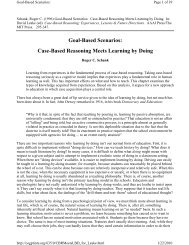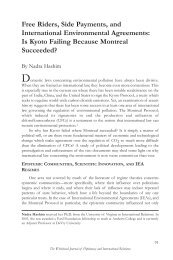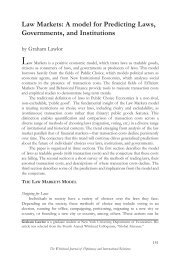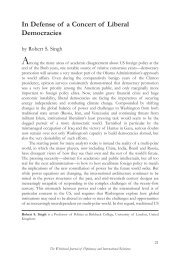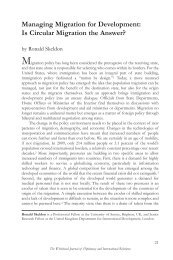Rethinking the Cuban Regime: Implications for Transition Paths and ...
Rethinking the Cuban Regime: Implications for Transition Paths and ...
Rethinking the Cuban Regime: Implications for Transition Paths and ...
Create successful ePaper yourself
Turn your PDF publications into a flip-book with our unique Google optimized e-Paper software.
REThInkIng ThE CUbAn REgIME<br />
<strong>for</strong> much of <strong>the</strong> population, <strong>and</strong> increases transnationalization of <strong>the</strong> productive<br />
structure <strong>and</strong> <strong>the</strong> depolitization of social issues. 6<br />
Sultanistic regimes can be characterized by <strong>the</strong> following words: personal,<br />
corrupt, destructive, <strong>and</strong> chaotic. These regimes, in which <strong>the</strong> ruler operates<br />
primarily based on personal discretion, were identified as a distinct typology after<br />
multiple existences of such rule. 7 In sultanistic regimes, economic <strong>and</strong> social<br />
pluralism is subject to unpredictable <strong>and</strong> despotic intervention from <strong>the</strong> sultan’s<br />
despotic power. This regime type has no guiding ideology, but ra<strong>the</strong>r an extreme<br />
glorification of <strong>the</strong> ruler <strong>and</strong> a highly arbitrary manipulation of symbols. It involves<br />
occasional, low <strong>and</strong> ceremonial mobilization led by coercive <strong>and</strong> clientelist methods<br />
without permanent organization. Sultanistic leaders are highly personalistic <strong>and</strong><br />
arbitrary. They possess strong dynastic tendencies <strong>and</strong> its staff ’s position derives<br />
from <strong>the</strong>ir purely personal submission to <strong>the</strong> ruler. 8 Sultanistic regimes are different<br />
from authoritarian regimes <strong>and</strong> o<strong>the</strong>r <strong>for</strong>ms of non-democratic rule in <strong>the</strong> rulers’<br />
overall conception of politics, <strong>the</strong> structure of power, <strong>and</strong> <strong>the</strong> relation to <strong>the</strong> social<br />
structure, <strong>the</strong> economy, <strong>and</strong> <strong>the</strong> subjects of <strong>the</strong> sultanistic rule.<br />
Ano<strong>the</strong>r type of non-democratic regime is totalitarianism. Totalitarian regimes<br />
have an “exclusive, autonomous, <strong>and</strong> more or less intellectually elaborate ideology<br />
with which <strong>the</strong> ruling group or leader, <strong>and</strong> <strong>the</strong> party serving <strong>the</strong> leaders, identify <strong>and</strong><br />
which <strong>the</strong>y use as a basis <strong>for</strong> policies or manipulate to legitimize <strong>the</strong>m.” 9 The guiding<br />
ideology goes beyond a particular program or definition of <strong>the</strong> boundaries of<br />
legitimate political action to provide a reachable utopia. Totalitarian systems<br />
encourage, dem<strong>and</strong>, reward, <strong>and</strong> channel citizen mobilization <strong>for</strong> political <strong>and</strong><br />
collective tasks through a vast network of regime-created, party-led obligatory<br />
organizations <strong>for</strong> political <strong>and</strong> collective mobilization that belittles private life.<br />
Totalitarian leaders, rarely charismatic, rule with undefined limits <strong>and</strong> great<br />
unpredictability <strong>and</strong> rise to power from success <strong>and</strong> commitment in <strong>the</strong> party. They<br />
concentrate vast amounts of power <strong>and</strong> are object of a cult of personality. It is worth<br />
mentioning that even though such a leader is highly probable in a totalitarian system,<br />
his existence is not necessary <strong>for</strong> regime stability. As Linz points out, succession<br />
crisis that were thought to threaten <strong>the</strong> stability <strong>and</strong> survival of a totalitarian regime<br />
“have not led to <strong>the</strong>ir downfall or breakdown even when <strong>the</strong>y have been very critical<br />
<strong>for</strong> <strong>the</strong>m.” 10 Thus, changes in <strong>the</strong> relationship between leadership, ideology, <strong>and</strong><br />
mobilization are <strong>the</strong> elements likely to offer <strong>the</strong> best clue <strong>for</strong> <strong>the</strong> construction of <strong>the</strong><br />
typology of totalitarian regimes, as well as <strong>for</strong> <strong>the</strong>ir consolidation, stability, change,<br />
<strong>and</strong> possibly even <strong>the</strong>ir breakdown.<br />
Finally, Linz <strong>and</strong> Stepan conceptualized post-totalitarianism as a regime type that<br />
requires <strong>the</strong> pre-existence of a totalitarian state. Post-totalitarianism may emerge <strong>and</strong><br />
evolve as <strong>the</strong> result of three distinct but interconnected processes. Firstly, <strong>the</strong>y come<br />
about as a result of deliberate policies of <strong>the</strong> rulers to soften or re<strong>for</strong>m <strong>the</strong><br />
totalitarian system (detotalitarianism by choice). Secondly, <strong>the</strong>y emerge from <strong>the</strong><br />
internal erosion of <strong>the</strong> structures of <strong>the</strong> totalitarian regime <strong>and</strong> of <strong>the</strong> cadres’<br />
ideological belief in <strong>the</strong> system (detotalitarianism by decay). Thirdly, <strong>the</strong>y manifest<br />
www.journalofdiplomacy.org<br />
131<br />
Summer/Fall 2010




